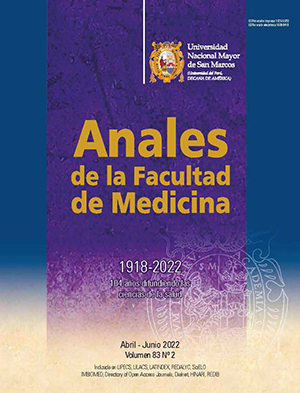¿Es posible que nuestra generación enfrente una nueva pandemia causada por otro Coronavirus?
DOI:
https://doi.org/10.15381/anales.v83i2.23009Palabras clave:
Coronavirus, COVID-19, Evolución Biológica, Interacciones Huésped-Patógeno, Salud Única, (fuente: DeCS BIREME)Resumen
La actual pandemia de COVID-19 fue inducida por la emergencia de un coronavirus en un animal reservorio. De esta manera, es de gran importancia conocer como ocurre la evolución de estos agentes virales en la naturaleza. En este artículo, son presentados los principales mecanismos asociados a la evolución de los coronavirus considerando las especies de animales que actúan como reservorios o huéspedes evolutivos, los mecanismos genéticos virales arrollados en la generación de variantes virales y la contribución de las acciones humanas que puedan generar nuevos coronavirus recombinantes con potencial pandémico. Considerando los puntos discutidos en este artículo, concluimos que la generación de nuevos coronavirus podrá ser evitada con la implementación de políticas públicas que propongan acciones de salud única y así solo habrá salud humana habiendo salud ambiental y salud animal.
Descargas
Publicado
Número
Sección
Licencia
Derechos de autor 2022 Anales de la Facultad de Medicina

Esta obra está bajo una licencia internacional Creative Commons Atribución-NoComercial-CompartirIgual 4.0.
Aquellos autores/as que tengan publicaciones con esta revista, aceptan los términos siguientes:
- Los autores/as conservarán sus derechos de autor y garantizarán a la revista el derecho de primera publicación de su obra, el cuál estará simultáneamente sujeto a la Licencia de reconocimiento de Creative Commons que permite a terceros compartir la obra siempre que se indique su autor y su primera publicación esta revista.
- Los autores/as podrán adoptar otros acuerdos de licencia no exclusiva de distribución de la versión de la obra publicada (p. ej.: depositarla en un archivo telemático institucional o publicarla en un volumen monográfico) siempre que se indique la publicación inicial en esta revista.
- Se permite y recomienda a los autores/as difundir su obra a través de Internet (p. ej.: en archivos telemáticos institucionales o en su página web) antes y durante el proceso de envío, lo cual puede producir intercambios interesantes y aumentar las citas de la obra publicada. (Véase El efecto del acceso abierto).



